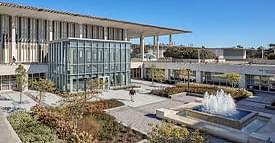Doctor of Philososphy [Ph.D] (Electrical and Computer Engineering)
$7,815/Yr
Tuition Fees
| Year | 1st Year Fees |
|---|---|
| Tuition Fees | $7815 (USD 7815) |
Students select an advisor and, with the advisor, plan an individual program bounded only by the broad guidelines of the Graduate College and the program. The department maintains close interdisciplinary ties with other University of Iowa departments, especially with the Departments of Physics and Astronomy, Computer Science (College of Liberal Arts and Sciences), Mechanical and Industrial Engineering, and Biomedical Engineering, and the Carver College of Medicine. Principal areas of graduate study include waves and materials, computer systems, wireless communications, signal and image processing, computational genomics, and control systems and systems theory. View principal areas of study under?Research and Study Areas?in the Electrical and Computer Engineering section of the Catalog.
The Doctor of Philosophy program in electrical and computer engineering requires a minimum of 72 s.h. of graduate credit. At least 45 s.h. must be earned in formal course work (not in thesis work or other independent study), including 30 s.h. from an approved list of electrical and computer engineering courses. For the list of approved courses, see?the?Electrical and Computer Engineering?Graduate Manual. Each Ph.D. student's study plan must be approved by the student's advisor and by the graduate committee.
Acceptance to the Ph.D. program requires successful completion of the Ph.D. qualifying process. The qualifying process consists of two parts?an examination and a course breadth requirement.?The half-day written exam is given once a year, late in the spring semester. It covers two subjects chosen by a student from a list of nine. Students normally are expected to take the qualifying examination within the first 30 s.h. of their graduate studies. A cumulative g.p.a. of at least 3.25 is required for admittance to the exam. Students who fail the examination may retake it only once?the next time it is offered. To complete the breadth requirement, students must take two courses associated with the same list of nine subjects that the examination is drawn from and complete the courses with grades of at least A-minus. The breadth courses must not duplicate the subjects chosen for the examination and must be completed within the fourth semester of graduate study.
TOP Scholarships
| Scholarship name | Award amount | Eligibility |
|---|---|---|
| - | - | - |
| - | - | - |
| - | - | - |
Key Resources for Your Study Abroad Journey
Scholarship Grants & Financial Aids
| Name | Scholarship Per Student | Level of Study | Type | |
|---|---|---|---|---|
| Richard A. Freund International Scholarship | Scholarship per student$ 5,000/Yr$5,000 | Level Of StudyDoctorate | TypeMerit-Based |
Similar Colleges


University at Albany


Northern State University


Abilene Christian University
.jpeg?h=143&mode=stretch)

Ohio Northern University


University of South Carolina


University of Akron


State University of New York Polytechnic Institute


University of New Mexico



























Comments